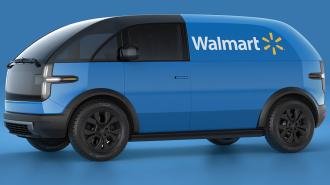Walmart will be rolling out a new fleet of electric delivery vehicles to reduce the retailer’s carbon footprint for the “last mile” of deliveries — that final, crucial, and intensive step of getting goods from stores to your front door.
The retail colossus is buying 4,500 vehicles from a fellow Bentonville, Arkansas-based company, Canoo, with the option of purchasing 10,000 more.
It’s a lifeline for a company that just months ago was warning that it may not have enough capital to bring their vehicles to market. The deal comes on the heels of a contract with NASA, which plans to use the EVs as transport vehicles for its Artemis missions.
Financial details of the deal aren’t being disclosed, but the vehicles are currently listed at $34,750 each on the automaker’s website.
Walmart plans to roll out a new fleet of electric delivery vehicles for the “last mile” of deliveries — that final, crucial, and intensive step of getting goods to your front door.
Walmart will use Canoo’s “Lifestyle Delivery Vehicle” (LDV), a capsule-shaped van with cargo space comparable to a Chevy Tahoe SUV, Axios reported.
The vans are a modified version of Canoo’s Lifestyle Vehicle, which the fledgling automaker claims will have a 250-mile max range, 120 cubic feet of interior space, and be capable of carrying 1,464 lbs. of payload.
It’s not a huge vehicle — a U-Haul cargo van offers a payload of around 4,000 lbs. and 246 cubic feet of space — but it’s comparable to smaller cargo vans, like Ford’s Transit Connect cargo van (1510 lbs. and 127 cubic feet).
Besides being fully electric, Canoo says their compact van has other advantages for package deliveries in cities.
“Our LDV has the turning radius of a small passenger vehicle on a parking friendly, compact footprint, yet the payload and cargo space of a commercial delivery vehicle,” Canoo investor/chairman/CEO Tony Aquila said in a statement.
Canoo describes the van as a “platform” that allows for customizable design, with space and weight savings from the absence of numerous cables and a steering column, TechCrunch reported.
A pilot run in the Dallas-Fort Worth metroplex will help determine final layouts “in the coming weeks,” Walmart said, with the goal of getting on the road by 2023.
The electric delivery vehicles, which Walmart will be able to customize, will be tasked with fulfilling online orders.
The delivery EVs will begin a pilot run in the Dallas-Fort Worth metroplex to help determine their final layout “in the coming weeks,” Walmart said, with the goal to be having them on the road by 2023. (But Canoo’s Oklahoma-based production plant may be delayed, so perhaps put that date in pencil.)
Walmart is already using some electric delivery vehicles in Arkansas, however — drones.
We’d love to hear from you! If you have a comment about this article or if you have a tip for a future Freethink story, please email us at tips@freethink.com.
